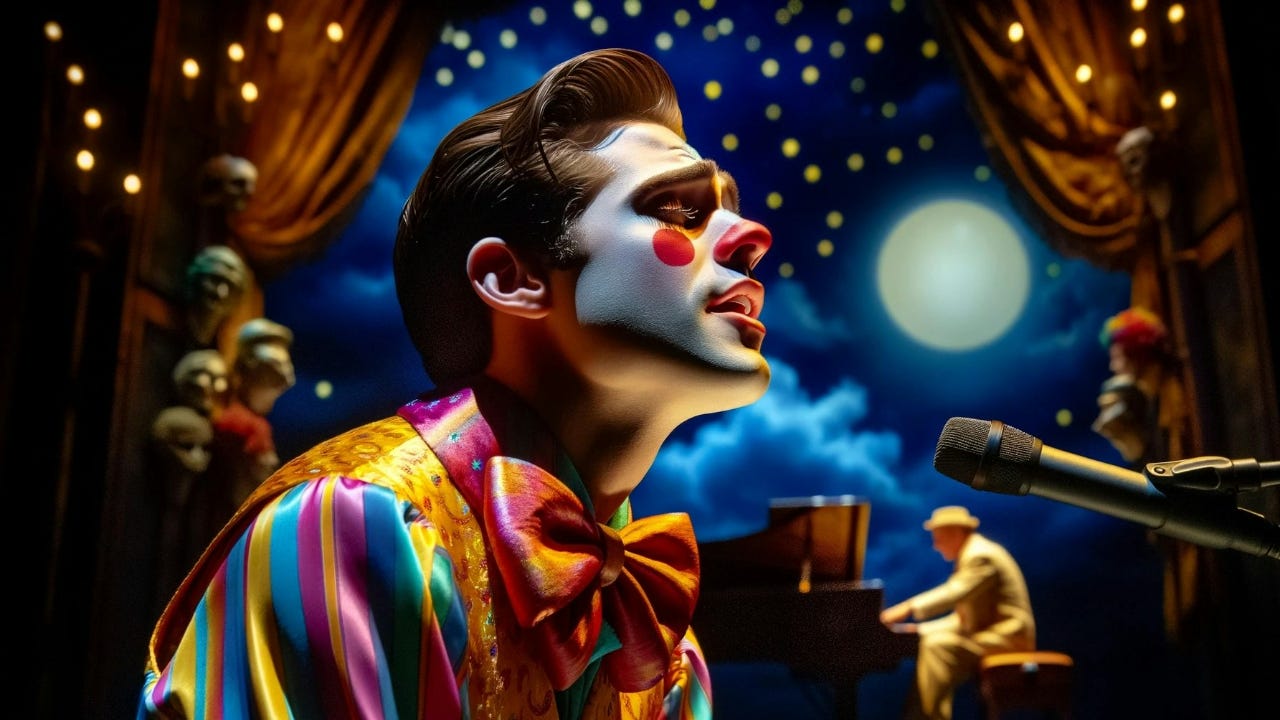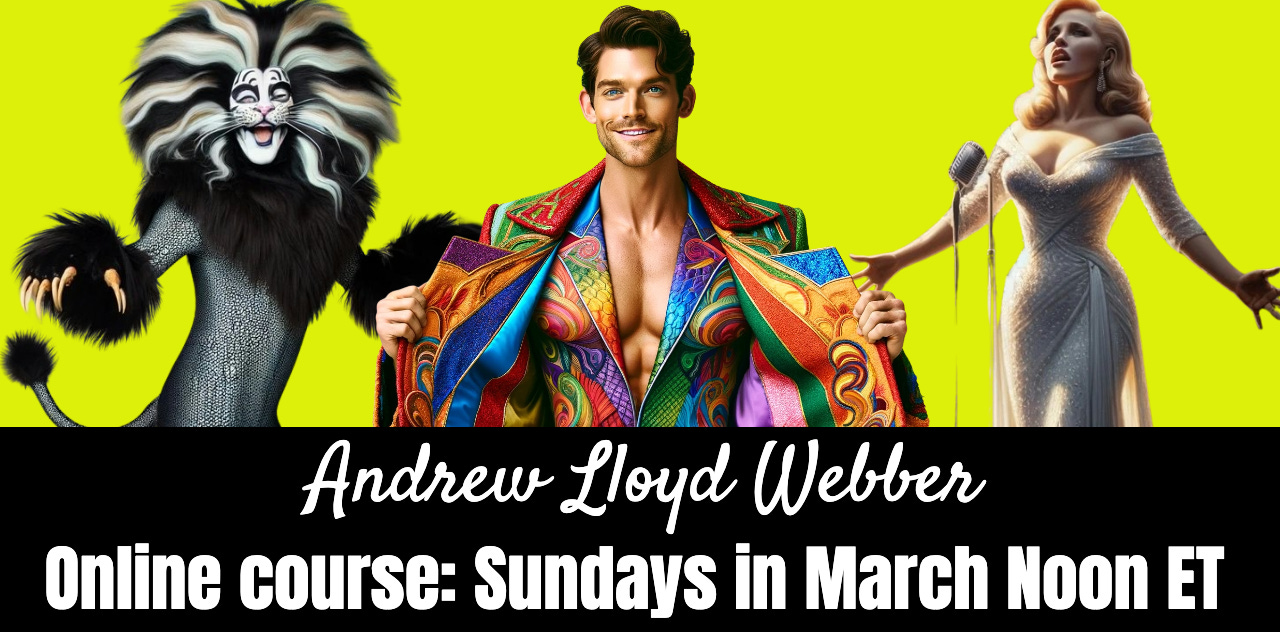Send in the WHAT? Explaining Sondheim’s most iconic number (today's MARQUEE)
“Clowns” revisited “with my usual flair”
Shalom, Broadway lovers!
In today’s FREE edition of MARQUEE: The Broadway Maven’s Weekly Blast: an exploration of the meaning of “Send in the Clowns” from A Little Night Music by Stephen Sondheim; the announcement of the first two Maven Scholars; Book of Mormon video homework regarding references to other musicals in the score; and a Last Blast about The Rocky Horror Show.
This week’s PREMIUM edition also includes a piano talk about Merrily We Roll Along (also by Sondheim); and a review of a compelling book about a high school drama teacher.
Isn’t it rich?
Stephen Sondheim’s “Send in the Clowns” from A Little Night Music is his most famous song, and it’s been interpreted in many ways, especially the issue of what the “clowns” are. Here’s my stab at that and other questions related to this iconic number (if you prefer to watch than read, there’s a video version available here):
BROADWAY BLAST A: Sondheim's most famous song, "Send in the Clowns," from A Little Night Music, cleverly incorporates the themes of Sondheim's previous two shows. The number echoes Company and Bobby’s fear of being left behind as he ages as well as the sense of melancholy and loss felt by the characters in Follies. Lyrics like “losing my timing” could apply to Company, and lyrics like “sure of my lines; no one is there” sound like they could have come from Follies. So the song references the missed connections, failed communications, and ironic twists of fate filling all three of the early 1970s shows that form Sondheim's fertile "middle period," and “Send in the Clowns” becomes a literal and figurative coda to the whole series. The intertextuality not only creates a consistent voice among shows but underscores A Little Night Music’s own wistful commentary on the complexities of love and timing, reflecting life's cruel serenade of missed chances: “Well, maybe next year.”
BROADWAY BLAST B: Had the “Send in the Clowns” lyric from A Little Night Music been “Aren’t we a pair?” it could be interpreted as a sense of wonder and even pride that they are the kind of couple they are. But when Desirée sings, asking “ARE we a pair?” we see the depth of her delusion and her ill-fated dream of a partnership with the married and disengaged Fredrik.
BROADWAY BLAST C: In Sondheim’s trademark “Send in the Clowns” from A Little Night Music, Desirée sings to Fredrik, “me as a merry-go-round” -- and he replies, “me as King Lear.” King Lear is a clear Shakespeare reference, but what if there’s a second allusion here – to a Broadway musical? A merry-go-round is essentially a carousel, and Sondheim knew the corpus of his mentor Oscar Hammerstein too well to not notice the term. So maybe he’s telling us that Desirée feels like Billy Bigelow from Carousel: a born performer who feels trapped and yearns for redemption.
BROADWAY BLAST D: So who are the clowns in "Send in the Clowns" from Stephen Sondheim's A Little Night Music? As Sondheim's most successful hit, that question has been asked ad nauseam. But many people miss the simple answer: clowns are the fools that Madame Armfeldt said were one of the three groups upon whom the summer night smiles, specifying Desiree as an example. Thus, the clowns represent not just fools in a literal sense but the folly of missed opportunities and the ironic twists of fate that define our lives, as seen through Desiree's eyes.
What do you think the clowns represent? Put your answers below.
PIANO TALK: In this week’s Piano Talk video, music educator Mateo Chavez Lewis examines Stephen Sondheim’s Merrily We Roll Along, now setting records in its Broadway revival. The show, which will be covered the first week of Sondheim Academy Act Two, features “32-bar songs.” Mateo explains what that is and how it’s expressed in “Now You Know,” and the rest of a show that is both one of Sondheim’s most traditional and most innovative.
CONGRATULATIONS: Another opening, another show: the first two Maven Scholars for 2024 have been announced. Ben Kaplan is a 22-year-old student at UMass-Amherst who plays the piano and is passionate about acting and music directing. Sheva Schwartz is a 20-year-old student at the University of Ottawa’s School of Music, where she studies cello performance and composition. Several spots are still open for this program for students 16-26, which involves an eight-week course in music theory and history Sundays in April and May. Upon completion of the program, participants receive $500, four invitations to Broadway shows, and a certificate of achievement. More information and the application are available at http://broadwaymaven.com/student-seminar. If you have questions, hit reply to this newsletter.
HOMEWORK: Broadway's The Book of Mormon contains multiple references to and spoofs of other Broadway shows. This video, your homework for Sunday’s Book of Mormon class, contains 10 examples across 10 shows; how many can you name? Be careful, there are two answers for one question, and one show is used twice. In alphabetical order, here are the shows you can choose from: Annie, Annie Get Your Gun, Joseph and the Amazing Technicolor Dreamcoat, Les Misérables, Little Shop of Horrors, The Lion King, The Little Mermaid, The Music Man, The Sound of Music, and Wicked.
NOTE: Sunday’s class on The Book of Mormon is FREE to new subscribers to the Premium version of MARQUEE (a $9 value). Or you can sign up below.
Andrew Lloyd Webber March has just been announced. We’re doing Joseph, Evita, CATS, and “Lesser Known Lloyd Webber.”
Sondheim Academy Act Two meets Tuesdays in March at Noon ET. Join Broadway Maven David Benkof, music educator Mateo Chavez Lewis, and Sondheim expert Gail Leondar-Wright as we discuss:
• March 5, Merrily We Roll Along
• March 12, James Lapine Shows
• March 19 Lesser-known Sondheim
• March 26 21st-century Sondheim
ALL ACCESS PASS: The Broadway Maven will host at least 50 more classes between now and the end of the year, and you can attend them all without registering or paying individually by purchasing a 2024 ALL-ACCESS Pass. Passholders get:
• automatic registration for all free and paid classes; just show up!
• fee waived for all tuition-based classes;
• Premium subscription to MARQUEE: The Broadway Maven’s Weekly Blast (a $36 value);
• Full access to the Archive (a $100 value); and
• Five exclusive Passholder experiences (bonus classes, guests, watch parties, etc.)
Upcoming content includes Sondheim Academy Act Two, Funny Broadway, Music theory for musical theater, Advanced seminar in Broadway history, Andrew Lloyd Webber, Rodgers & Hammerstein, and “Jewish Broadway” mini-courses, “Broadway’s Best” series, and special guests including Michael R. Jackson and Justin Paul. The Pass covers at least 50 classes and perhaps as many as 100.
The regular price is $225, but if you pay the Early Bird rate of $199 by February 29, you save $26.
OPEN POSITION: The Broadway Maven is looking for a theater fan with great organizational and writing skills to help with behind-the scenes work keeping the course and its projects thriving. Paid position. contact DavidBenkof@gmail.com for details.
Note: links to register for ALL classes are always available at TheBroadwayMaven.com.
• Sunday, February 25 Noon and 7 pm ET: “Funny Broadway”: The Book of Mormon ($9)
• Tuesday, February 27 Noon ET: Sondheim Academy (Sondheim’s Nations: Assassins and Pacific Overtures) registration closed except for ALL-ACCESS.
• Thursday, February 29 Deadline for the Early Bird rate for an ALL-ACCESS Pass. Save $26.
• Tuesday, March 5 Noon ET: Sondheim Academy Act Two (Merrily We Roll Along) $44
• Tuesday, March 12 Noon ET: Sondheim Academy Act Two (James Lapine shows) $44
• Tuesday, March 19 Noon ET: Sondheim Academy Act Two (lesser-known Sondheim) $44
• Monday, March 25 Noon ET: Dear Evan Hansen with Tony winner Justin Paul (just announced!). FREE (registration coming soon)
• Tuesday, March 26 Noon ET: Sondheim Academy Act Two (21st-century Sondheim) $44
• Monday, April 1 Noon ET: A Strange Loop with Pulitzer Prizewinner Michael R. Jackson. FREE (registration coming soon)
NOTE: As always, ALL-ACCESS Passholders do not have to sign up or pay for anything. Just show up!
LAST BLAST: The “time” reference in the song “Time Warp” from The Rocky Horror Show shows the song is not just a fun dance-by-numbers routine (“it’s just a jump to the left…”). It's also a nostalgic nod to the schlocky horror sensibilities of the 1950s, humorously out of “step” with the musical’s 1970s origins. The upbeat rhythm and faux-serious campy lyrics evoke the cinematic excess of that era, and the song’s interactive nature (inviting audience participation) was also reflective of bygone culture, in which dances like “The Loco-Motion” included instructions for participation. And participation is what Rocky Horror is most known for, whether it’s every member of the castle’s staff dancing the same steps in unison, or patrons of the many midnight screenings of the film that was the result of the musical’s success.
Broadway Maven David Benkof helps students further their appreciation of musical theater through his classes, his YouTube channel, and MARQUEE: the Broadway Maven’s Weekly Blast. Contact him at DavidBenkof@gmail.com.








